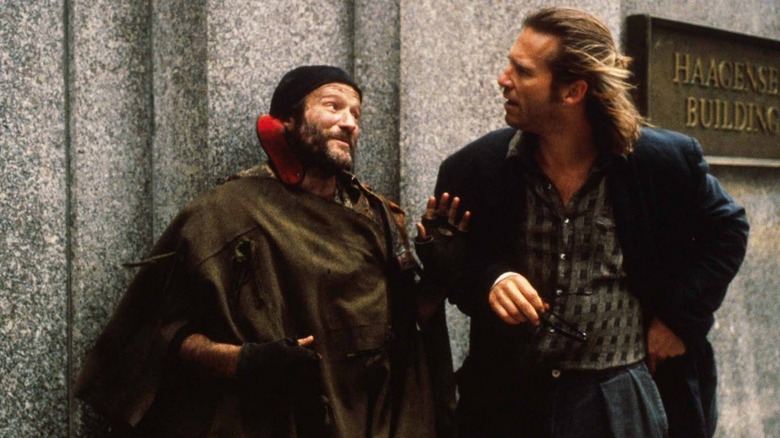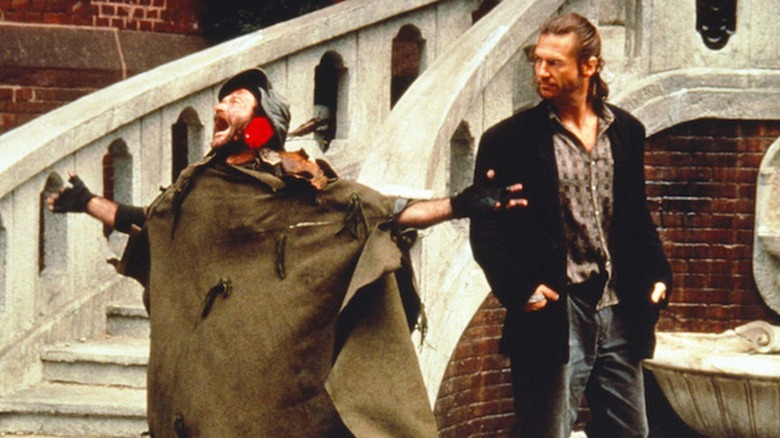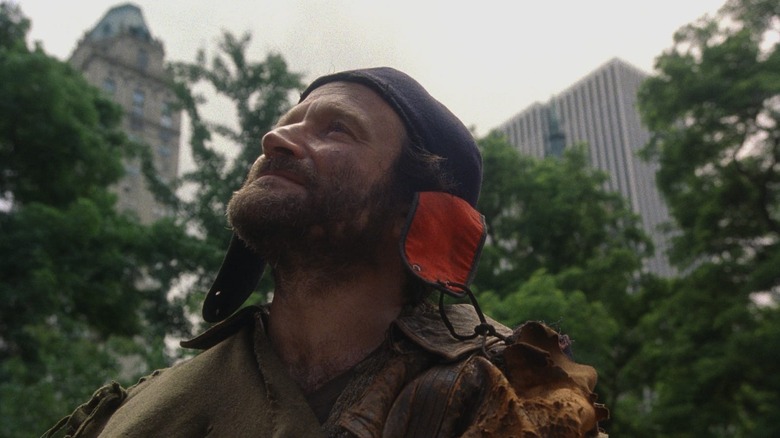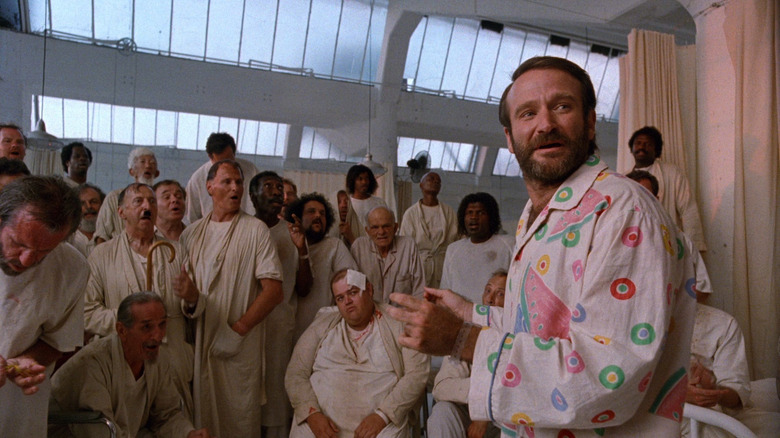Finding Robin Williams' Fisher King Co-Star Took Some Serious Casting Calculus
Terry Gilliam's 1991 Oscar-winning tragedy "The Fisher King" is raw and difficult. It's a film that appears to be a lighthearted, almost slapstick farce in certain scenes, but delves into heady themes of homelessness, mental illness, trauma, and guilt on a dime. It was a startlingly soulful film from a director who was then known for his kooky work with Monty Python, the acclaimed-but-argued-over "Brazil," and the not entirely well-received "The Adventures of Baron Munchausen." In contrast to those, it seemed "The Fisher King" had proven that Gilliam was maturing as a filmmaker.
"The Fisher King" is about a radio shock jock named Jack Lucas (Jeff Bridges) who, suffering from depression and openly misanthropic, gives some startlingly bad advice on his radio show one evening, his words inspiring a listener to commit a mass shooting at a restaurant. Jack becomes despondent. Years later, when a drunken Jack is attacked in the street by a pack of roving thugs who set homeless people on fire for fun, he is rescued by Parry (Robin Williams), a charismatic and delusional homeless man who, like Don Quixote, believes himself to be a knight. Jack will eventually learn that Parry suffered a psychotic break when Parry's wife was killed ... in a restaurant three years earlier. Jack, guilty, will spend the bulk of "The Fisher King" attempting to help Parry as much as he possibly can.
Williams was cast as Parry prior to Bridges signing on to play Jack, and Gilliam was concerned. Williams, still best known for comedies, needed a charismatic co-star that could match his energy, but not be so funny as to change "The Fisher King" into a farce. In a 1990 interview with the Los Angeles Times, Gilliam shared his casting trepidation.
'He can't be clever'
The balance of the two lead characters in "The Fisher King" was more delicate than Gilliam might have first realized. Parry had to be funny and charming, but also a man suffering from mental illness and hallucinations (he envisions a terrifying red knight at moments of stress) which he certainly didn't want to make light of, and indeed make seem unsettling. Meanwhile, Jack had to be capable of doing and saying horrible things — he was a radio shock jock, after all — but still be appealing enough that both Parry and audiences would want to spend time with him. Most importantly, it couldn't be a "funny bum" comedy. "I first met Robin just talking about who would play Jack, and I said it's got to be an actor who doesn't work on the same level as you do; he can't be a funny man, he can't be clever," Gilliam said of the casting dilemma.
"Why I like the idea of Jeff doing this is that he can be a real a**hole at the start of the thing and you still care about him. People like Jeff; you like him no matter how awful he is, there's something about him that'll drag you along. And Parry is such a fractured character; he's a really good bum, but we're trying to make it so that when he does have his hallucinations they're really ugly; he's disturbing."
It should be noted that "funny bum" comedies were common at the time, with several filmmakers actively trying to make light of the rising homelessness issue. "Curly Sue," "Down and Out in Beverly Hills," "With Honors," and "Life Stinks" all came out within a few years of each other.
Robin's alive again
When "The Fisher King" was selected to be included in the Criterion Collection in 2015 — several years after Williams' death — Gilliam was interviewed again by IndieWire, and the director admits to dreading the thought of revisiting the movie. Williams had only been dead a few weeks when Gilliam would have to oversee the film's restoration, meaning watching Williams over and over again. (Criterion endeavors to make their films look as clean and accurate to the director's intent as possible.) Gilliam admits, however, that seeing Williams made him happy:
"You know, when we were doing this newer, cleaned up Criterion version, I had to look at the movie again and it was literally just a couple weeks after Robin died. I was not looking forward to it. I just thought, 'Oh, this is going to be a killer.' But I came out, I was just grinning and smiling. Robin's alive, he'll be alive forever with this film. That character, Parry, is so Robin, he's such a complete cross section of who Robin was. It was joyous watching it again. In the end, I thought, 'Wow, this is a great monument to Robin.'"
In an additional piece of casting alchemy, Gilliam reveals that Robin was interested in the project prior to his being hired as a director. Gilliam figured that TriStar hired him as a way to make the project seem more appealing to Williams, then a legit movie star with hits like "Dead Poets Society" and "Good Morning, Vietnam" just behind him.
Floating off into the ether
In speaking with IndieWire, Gilliam talked about his own presence being used to "sweeten the pot," as it were, but also returns to the notion that Williams required a performer who could balance him well. This, Gilliam revealed, was important not just to prevent "The Fisher King" from becoming a "bum comedy," but vital to keeping him on his best behavior; Gilliam knew his tendency to goof around on set with someone as funny and energetic as Williams could potentially foul up production.
"Working with him ... I think the real reason they hired me, was that I was the bait to lure Robin in. We just worked together on 'Munchausen.' I was the honey trap. That was easy. Robin was right there for the get-go. To me then the biggest thing was to make sure Robin and I didn't float off into the ether there. We just could wind each other up brilliantly and just get extremely silly. Jeff was the anchor, that's why Jeff was so important; he became the anchor to keep the whole film, Robin, myself grounded."
"The Fisher King" was ultimately nominated for five Academy Awards, with Mercedes Ruehl winning Best Supporting Actress for her role as Anne Napolitano. Gilliam's filmography is loaded with spasms of fitful chaos, and his films are notorious for horrendous production troubles. "The Fisher King" seemed to nail the correct alchemy, allowing both director and actors to play well together.
"The Fisher King" is currently available to watch on HBO Max, Cinemax Go, and DirecTV.



